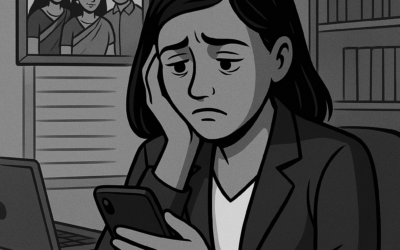Start a social enterprise Have otherwise formally unemployed women in Rajasthan make dupattas. Have women in Rajasthan make dupattas, count the sweat that falls from their chins, and add it to the GDP. Count sweat by the sound it makes when hitting the ground and memorise the taal before the dupattas sweep it up. Dupattas will sell well in Delhi, in Hyderabad, not so much in Bangalore. Wash, iron, pack, ship. Nevermind the remaining dabs of ghee, spots of haldi, and hints from where the needle pricked the otherwise formally unemployed woman in Rajasthan. Sell dupattas to women in Hyderabad. They will use them to wipe sweaty brows knitted against the sun They will tie them over their heads and then against their noses. Sell dupattas that'll keep away heat strokes and air peppered with cement Sell dupattas that hold off sun and dust on one end and hold in sweat on the other Sell dupattas to women in Hyderabad who will tie them pressed against their lips. Only it will know when she smiles. Sell dupattas to women who need to swear softly at cars, with loud horns and horned men Sell dupattas to women who need shielding from drooling tongues between dripping fangs Sell armour to women and call it a 'dupatta'. Have formerly unemployed women in Rajasthan make armour and sell it to women in Hyderabad. Sell armour to women and call it "regressive". Sweat from the woman who cut the cloth, sweat from the woman Who sewed the button, sweat from the woman who closed the seam, And sweat from the woman who tied the knot. Sweat whispers to sweat. Makes a thangka of sweaty stories. Turns a dupatta into a tectonic plate of sweaty fight. Start a social enterprise and when you've made a thousand cut, sewn, bought, tied, retied, kissed, yanked, stained, sweaty dupattas, we'll call it mahila vikaas
October

Image Source: Sadhna.org
Sadhna is a mutual benefit trust in Rajasthan. It was founded to provide gainful employment to rural women with sartorial skills. Today, it is a self-sustaining social enterprise that employs 714 women artisans and supplies to the likes of FabIndia.
During our India Fellow induction training, I had the opportunity to visit the Sadhna office in Udaipur. Sitting among piles of brightly-dyed kurtis, I watched as the artisans sort sizes and calculate accounts. They showed me their different stitches and the many pieces they’d each worked on. They spoke of the value chain in a matter-of-fact way, never once with the hint of charity that colours many other social initiatives. At one point, the store manager said, “There is a huge market for dupattas in Hyderabad and Delhi. But we don’t sell them in Bangalore; no demand there.” I remember leaving the office feeling a mix of awe and relief. This was a collective of empowered women. Every product in the room symbolized to me the potential in the intersection of business and development.
November
For my placement, I flew from Udaipur to Hyderabad, dizzy with excitement to begin this new journey. On my first day in the city, the roads knocked the Mumbai right out of me. Men stare at women in public. This bit is universal. In Mumbai, I would stare back. At some point, they would look away. Sometimes after too long, but eventually shame would take over as it should. But in Hyderabad, I found that staring came with less innocuous honks and shouts, sly grins and lewd gestures. Staring back was useless.
Soon enough, I started wearing a dupatta across my face. I became one among other anonymous women on Hyderabad’s streets. I’ve kept the dupatta on my face. I still turn my head away from prying eyes but so far, no more cars have circled around my bike to gesture obscenities. Today, riding home from work with a dupatta around my face, I was reminded of the dupattas in the hands of Sadhna’s artisans. I wondered how many women’s hands a single dupatta must’ve touched. How it traveled from one end of the country to the other, meaning different things along the way — empowerment to some, not to others.

Is she safe?
Does Covering My Face Make Me A Bad Feminist?
Perhaps.
In the long-run, the only way to curb threats to women in public is to normalize women in public. By covering my face, I am complicit in a culture where the female body in public is the center of an unusual sort of interest. (Read Why Loiter? by Shilpa Phadke, Sameera Khan, & Shilpa Ranade). And that’s a conscious decision I’m making. I am trading the opportunity to be part of incremental change for the personal ease that comes from not having my face open for public scrutiny. Clearly, I have sold out long-term feminist progress. And yet, on some short-term level, covering up has come to take a feminist twist (at least in my head). The male gaze does as it pleases, takes what it pleases. It lays claim on my body in public; staring, dissecting, turning me into a spectacle for as long as it wants. When I cover my face, it’s as if I reclaim my right not to be turned into a spectacle. As if to say,
“Watch as I exist here without giving you the satisfaction of owning me. Watch me participate in public and not become landscape.”
I am aware this is quite a twisting of symbolism. This explanation could well just be my conscience trying to make peace with veiling myself. I could lay out every counter-argument to this interpretation myself. And yet, when I cover, I am emboldened. Not just less threatened, but actively emboldened. And I guess — in a short-term sense — this is my empowerment.






Beautifully put Ashni. It’s nuances like these that are so often missing in discourses on feminism and empowerment. I must confess, I too have wondered if covering my face while out in public makes me a bad feminist. You’ve given me a different perspective to look from when I encounter these (purdahed by choice) women in our cities now.
Beautifully put Ashni. It’s nuances like these that are so often missing in discourses on feminism and empowerment. I must confess, I too have wondered if covering my face while out in public makes me a bad feminist. You’ve given me a different perspective to look from when I encounter these (purdahed by choice) women in our cities now.
here is to making peace to our lived experiences and our politics.
here is to making peace to our lived experiences and our politics.
Dear Ashni, this is very beautifully captured. If you can, please read ‘The Sari’ by Mukulika Banerjee and Daniel Miller which I will upload on the Pustakalya for everyone to access. I think you’ll like it. 🙂
Dear Ashni, this is very beautifully captured. If you can, please read ‘The Sari’ by Mukulika Banerjee and Daniel Miller which I will upload on the Pustakalya for everyone to access. I think you’ll like it. 🙂
It is evident from your writing that you felt deeply about writing this one. And we feel you too. The way you can easily articulate your thoughts in a very organized manner, connecting pieces and making it as clear as one possibly could, is truly commendable. Always love reading your blogs 🙂
It is evident from your writing that you felt deeply about writing this one. And we feel you too. The way you can easily articulate your thoughts in a very organized manner, connecting pieces and making it as clear as one possibly could, is truly commendable. Always love reading your blogs 🙂
I love the poem like i have already mentioned to you and it is such a beautiful portrayal of a dupatta’s journey and the number of women involved in its journey.
I love the poem like i have already mentioned to you and it is such a beautiful portrayal of a dupatta’s journey and the number of women involved in its journey.
“This is my Empowerment”. Oh so profound Ashni. To the love-hate relationships with dupattas and women behind. For a change, I think I’d like to see men behind veils too, even if as a social experiment.
“This is my Empowerment”. Oh so profound Ashni. To the love-hate relationships with dupattas and women behind. For a change, I think I’d like to see men behind veils too, even if as a social experiment.